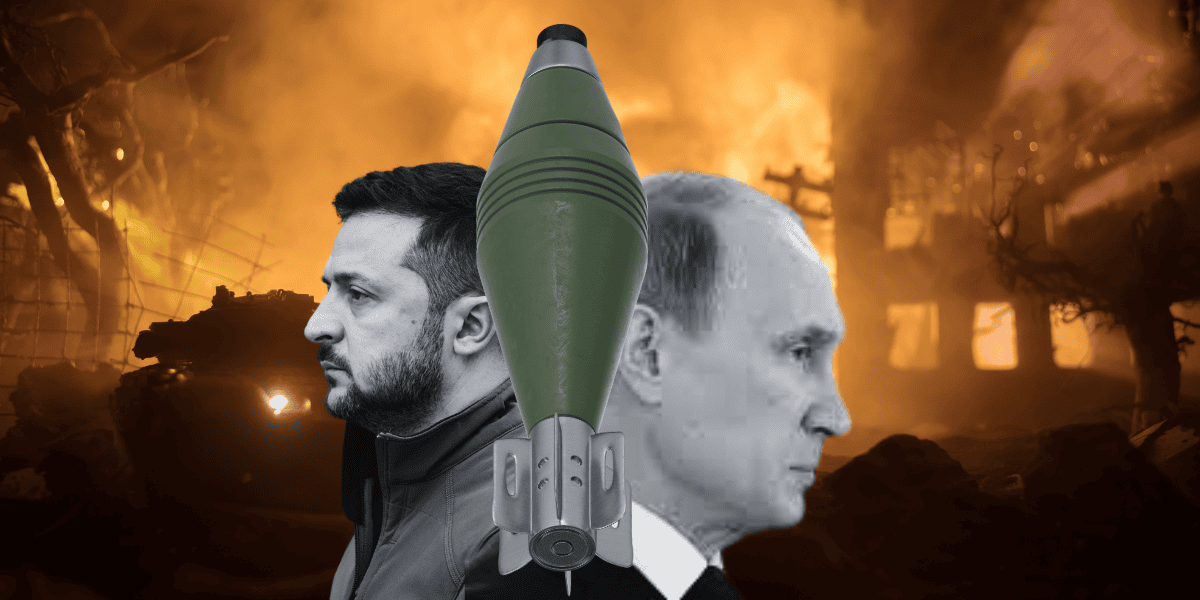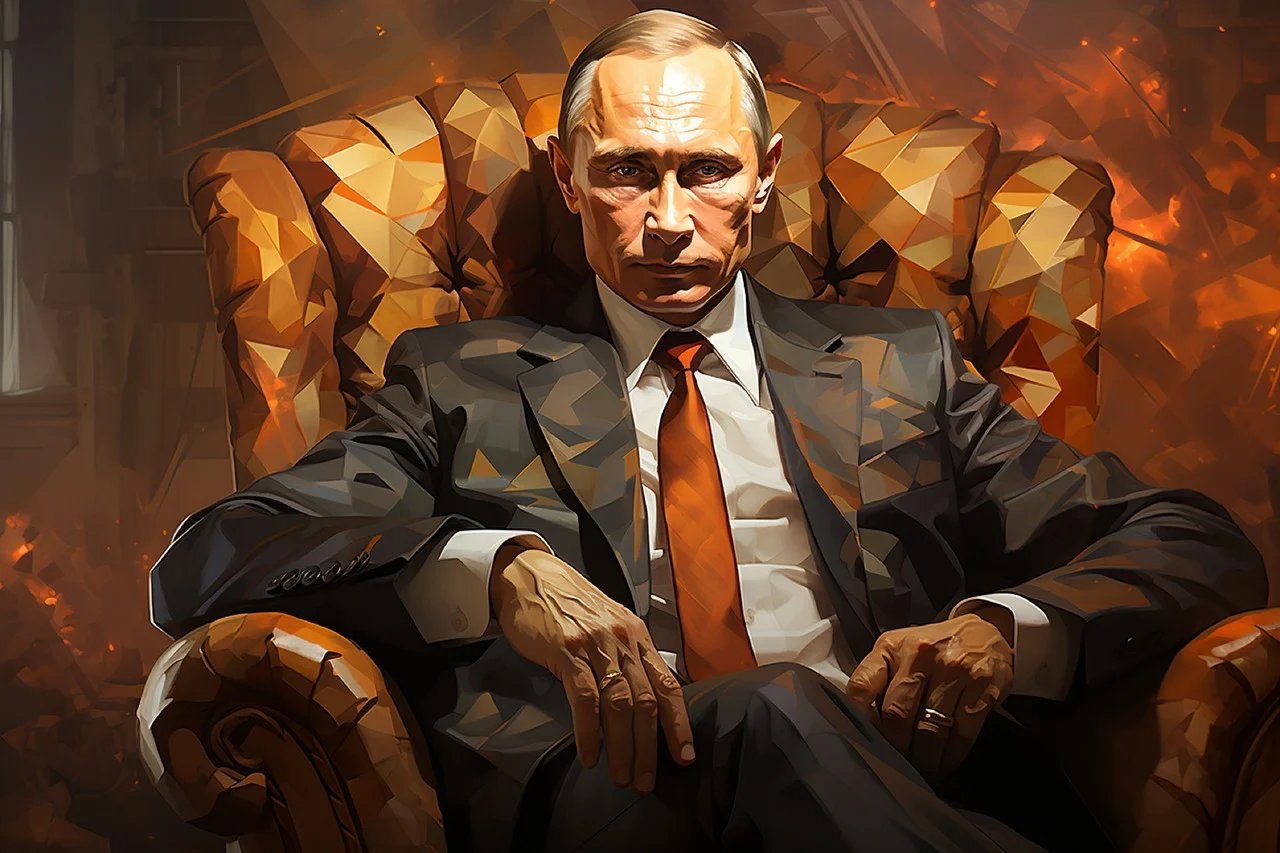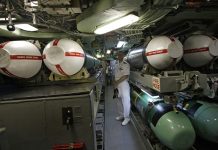Five months after its blitzkrieg military incursion in Russia’s Kursk oblast that shocked many, Ukraine is struggling to hold on to hard-won land. It faces the stark choice of choosing between swift retreat or crushing defeat, even as Kyiv is trying to hold this territory at all costs as a potential bargaining chip during eventual peace talks.
US officials told Bloomberg that they believe Ukraine may only have a few months left in its incursion into Kursk Oblast until Ukraine’s military is “forced to retreat from the region or risk being encircled by Russian forces.”
Speaking on the condition of anonymity, two US officials said that they hoped that President Volodymyr Zelenskyy would choose to retreat from Kursk to avoid suffering high casualties as the Ukrainian Army is already grappling with a lack of manpower on other war fronts.
US officials believe Ukraine has already lost almost half of the territory it seized in Kursk oblast during its lightning incursion in August last year, and it can hold on to the remaining territory only till spring.
Earlier in November, a source in Ukraine’s General Staff confessed to Reuters that Ukraine has lost over 40 percent of the territory it previously gained in Russia’s Kursk Oblast.
“At most, we controlled about 1,376 square kilometres (531 square miles), now of course this territory is smaller. The enemy is increasing its counterattacks. Now we control approximately 800 square kilometers (309 square miles). We will hold this territory for as long as is militarily appropriate,” the unnamed source was quoted as saying by Reuters.
Five months after Ukraine’s blazing offensive that saw Russia losing its territory for the first time since Adolf Hitler’s Operation Barbarossa, Germany’s invasion of the Soviet Union in June 1941, Ukrainian troops are “bloodied” and “demoralized.”

A campaign that former Dutch Defense Minister Kajsa Ollongren cited as “a model of military excellence” now risks being cited as an example of ‘strategic shortsightedness,’ where political considerations trumped military objectives.
“Battles are so intense that some Ukrainian commanders can’t evacuate the dead. Communication lags and poorly timed tactics have cost lives, and troops have little way to counterattack,” seven front-line soldiers and commanders told The Associated Press on condition of anonymity.
Ukraine’s Kursk Operation: A Border Raid That Turned Into Occupation
Ukraine’s military operation in Kursk has remained an enigma for military planners. When it was launched in August, Russia was caught unaware. There was widespread shock and awe at the speed at which Ukraine turned the tables and occupied the territory of its much bigger and stronger neighbor, Russia.
However, despite the bravado, few understood what Kyiv sought to achieve from its counteroffensive.
Now, in retrospect, it seems that it was an occupation that was never meant to be. Ukraine walked into Kursk and occupied Russian territory in a state of absentmindedness.
In fact, even weeks after the incursion, the specific objectives of the invasion were not clear even to the top echelons of the Ukrainian Army.
In an interview with CNN in September, Ukrainian Army chief Oleksandr Syrskyi said Ukraine attacked Russia in the Kursk oblast as Moscow was planning to attack Ukraine from the Kursk region.
Syrsky added that he considers the operation in Kursk a success because it reduced the threat of an enemy attack.
That Russia had no such plans for attacking Ukraine from Kursk should have been clear to the Ukrainian Army with the swift victory they achieved in Kursk, finding no resistance at all before Russia started mobilizing troops in Kursk.
The Kursk operation began on August 5, last year, when Ukrainian troops in the Sumy region were asked to leave for what they thought would be a nine-day raid in Kursk to shock the enemy.
The initial mission was to move only to the town of Korenevo, 25 kilometers (16 miles) into Russia. However, impressed with their rapid success, the troops were ordered to move beyond the original mission, Ukrainian commanders told The Associated Press.
The raid turned into an occupation when Ukraine encountered little resistance at the border and was able to occupy over 1300 square kilometers within a week, almost the same territory that Russia had won in the whole of 2024 with small but steady incremental gains.
Once in control of a large swathe of Russian territory, President Zelenskyy considered holding the captured territory indefinitely to bring Russian President Vladimir Putin to the negotiating table.
In an interview with NBC News in September, Zelenskyy said, “We don’t need the Russian territory. Our operation is aimed to restore our territorial integrity. We capture Russian troops to replace them with the Ukrainian. We tell them, you know, we need our military soldiers in exchange with the Russian one. The same attitude is to the territories. We don’t need their land.”
The incursion was hailed as a great triumph for Kyiv, which has “humiliated” Russian President Vladimir Putin. After all, this was the first time since the World War that a foreign military power had occupied Russian territory.
“It was brilliantly organized: the tactics, secrecy, and use of various systems. I think it will in the future be studied in all school textbooks and military academies worldwide,” Former Dutch Defence Minister Kajsa Ollongren said during an interview with LIGA.net.
Michael Kofman, a Senior Fellow at the Carnegie Endowment for International Peace, and Rob Lee, a Senior Fellow at the Foreign Policy Research Institute, argued that besides demonstrating Ukraine’s strength and challenging the narrative of Russian invincibility, Kursk’s success would influence cautious American policymakers to provide more material and military assistance to Kyiv.
With all that bravado, it seems, Ukraine and the West fell victim to their own propaganda. They believed that the shock offensive would unnerve Vladimir Putin to withdraw troops from the Donetsk front and relieve pressure on Ukrainian troops on the eastern front.
Some went as far as to suggest that Kursk’s defeat could be the undoing of Putin. However, despite testing circumstances, Putin held his nerve.
Putin Remains Unmoved
Notwithstanding Western doomsday predictions about Putin’s leadership following Ukraine’s Kursk gambit, Putin held his nerve and did not panic. He understood from the beginning that the gambit was to make him pull out troops from the Donetsk front, which would relieve pressure on Ukrainian troops there.
On September 5, a month after the Kursk operation began, Putin dismissed the Kursk incursion as a “reckless adventure” with “no military value” and said that the eastern Donbas region remained the main war aim.

Putin even claimed that by bringing “quite well-prepared units” into Kursk from elsewhere, Ukraine had made Moscow’s advance in Donbas quicker. “The enemy weakened itself in key areas, our army has accelerated its offensive operations.”
By November, Putin had amassed over 50,000 troops in Kursk, and the Russian counter-offensive began. Within one month, Ukraine had already lost nearly half of the territory it had held in Kursk, as one Ukrainian commander told Reuters.
The latest assessment by US officials is that Ukraine can hold to Kursk only till spring, and the longer Kyiv holds to Kursk, the more casualties it will suffer.
From “Tactical Brilliance” To “Strategic Catastrophe”: Changing Narratives Of Kursk Operation
As the situation changed on the Kursk battlefield, so did its narrative. What was hailed as a great Triumph for Ukraine is now increasingly termed strategic short-sightedness.
Dr Marina Miron, a defense researcher at Kings College London, told BBC that the Kursk incursion has been a “strategic catastrophe” for Ukraine.
“The whole idea was to maybe gain some political leverage in potential negotiations, but militarily to draw the Russian forces away from the Donbas in order to liberate Kursk. And what we’re seeing instead is that Ukrainian units are tied down there,” Dr Miron said.
Some of Kyiv’s most experienced and effective units are known to be fighting in Kursk. Miron even suggested that the Ukrainian eastern front “might actually collapse” if Russia continued to advance at pace.
Calling the Kursk invasion a huge “strategic error,” Andrew Latham, a senior fellow at the Institute for Peace and Diplomacy, wrote in The Hill, “This reckless gambit, more akin to a desperate stunt worthy of a second-rate actor than a seasoned statesman, diverts critical resources from the primary battlefield while offering negligible strategic gain.”
Meanwhile, the situation on the battlefield in Kursk is getting desperate for Ukrainian troops.
Ukraine’s Front-line commanders in Kursk told The Associated Press that half of their troops were dead or wounded.
“Conditions are tough, morale is low and troops are questioning command decisions, even the very purpose of occupying Kursk.”
What Went Wrong
So, what went wrong for Ukraine?
Firstly, while in Donbas, Ukrainians were fighting in their own country; Kursk was a foreign land, an area they didn’t know very well, which made their mission difficult.
Most of the troops who took part in the Kursk operation were redeployed from other parts of the frontline, areas they had become extremely familiar with over the past two and a half years.
One Ukrainian commander told CNN how their units got lost in Kursk.
“We ended up going to (the Russian town of) Sudzha, where we had to wait for our commander to find us,” he said, adding poor visibility and the crew’s lack of knowledge of the terrain made navigation extremely difficult.
Communication was another major issue. GPS navigation was not working, cellphone signals were jammed, and establishing communication with commanders was always a challenge. With GPS and phone signals down, Starlink internet service was their only option. However, Starlink did not work at all in many parts of Kursk.
The Elon Musk Factor
Another theory swirling on X (formerly Twitter) blames Elon Musk for Ukraine’s impending defeat in Kursk. The theory goes that Musk hastened the unraveling of Ukraine’s Kursk gambit by turning off Starlink for Ukrainian troops in Kursk as he did not want to aid Ukraine’s offensive on Russian land.
While unconfirmed, it is pertinent to note that in 2023, Musk himself acknowledged that he refused a Ukrainian request to activate his Starlink satellite network in Crimea’s port city of Sevastopol to aid an attack on Russia’s fleet there, saying he feared complicity in a “major” act of war.
On September 8, 2023, Musk wrote on Platform X: “There was an emergency request from government authorities to activate Starlink all the way to Sevastopol. The obvious intent being to sink most of the Russian fleet at anchor. If I had agreed to their request, then SpaceX would be explicitly complicit in a major act of war and conflict escalation.”
It would not be surprising if Musk denied a similar request in Kursk, which is explicitly Russian territory.
North Korean Soldiers In Kursk
Ukraine had hoped that the Kursk gamble would force Putin to withdraw troops from the Donbas front, where Ukraine was steadily losing territory. However, Russia had large reserve forces, and Putin could deploy over 50,000 soldiers in Kursk without withdrawing from the Donbas front.
Additionally, over 12,000 soldiers came from North Korea. By November, some of Ukraine’s most well-armed and best-trained soldiers found themselves tied down in the Kursk region, while Ukraine kept losing territory on the Donbas front.
As Ukraine finds itself in a precarious situation in Kursk, it is safe to say that, ultimately, the Kursk operation was a gamble that generated headlines but failed to change the direction of the war. If anything, it only hastened Ukraine’s losses in the Donbas region.
- Sumit Ahlawat has over a decade of experience in news media. He has worked with Press Trust of India, Times Now, Zee News, Economic Times, and Microsoft News. He holds a Master’s Degree in International Media and Modern History from The University of Sheffield, UK. He is interested in studying Geopolitics from a historical perspective.
- He can be reached at ahlawat.sumit85 (at) gmail.com




